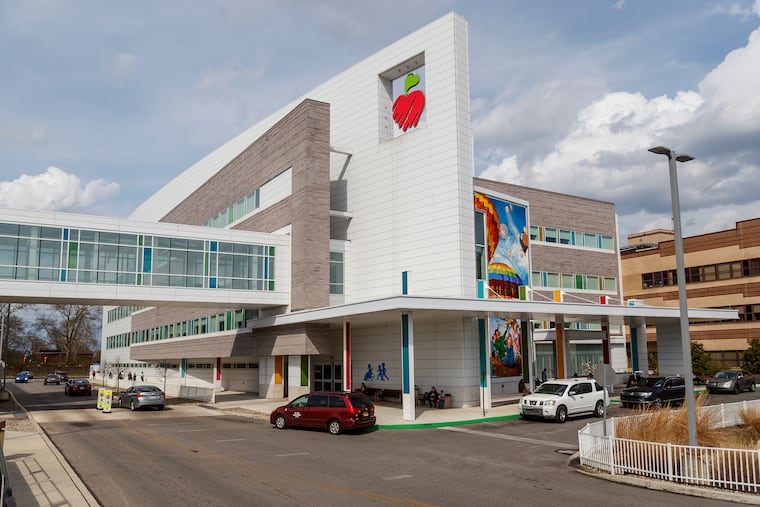Four Philadelphia health institutions seek to save St. Christopher’s Hospital for Children
Einstein Healthcare Network, Jefferson Health, Philadelphia College of Osteopathic Medicine, and Temple Health said Wednesday they had formed a consortium to negotiate such a deal.

Four stalwarts of the Philadelphia health-care community are joining forces to explore a purchase of St. Christopher’s Hospital for Children, the sister institution of soon-to-be-closed Hahnemann University Hospital.
Einstein Healthcare Network, Jefferson Health, Philadelphia College of Osteopathic Medicine, and Temple Health said Wednesday that they had formed a consortium to negotiate such a deal.
St. Christopher’s and Hahnemann both are part of the recent Chapter 11 bankruptcy filing by their owner, Philadelphia Academic Health System, which aims to close Hahnemann on Sept. 6, though certain services already have stopped.
A lawyer working on the bankruptcy said Wednesday that the purchase price would likely be revealed as part of the court process soon. The case’s next court date is Friday.
Hospital finance experts differed widely on a possible price tag, with one estimating a value in the $25 million range. The land and hospital facilities are owned separately by Philadelphia Academic, and so would be sold in a transaction apart from the bankruptcy process.
The four consortium members all have academic affiliations with St. Christopher’s to train physicians, nurses, or other health-care staff. The group said it would submit a letter of intent to the hospital owner’s parent company.
The group’s overture was welcomed by the leadership of St. Christopher’s. The announcement of the consortium included a statement from Achintya Moulick, the chief medical officer and chairman of cardiothoracic surgery at St. Christopher’s.
“In a time of difficult transition for health care in Philadelphia, four health-care organizations stepping up to do what’s right by St. Christopher’s patients is truly emblematic of neighbors helping neighbors,” Moulick said. “This will ensure continuity of care and service to the children of the community it serves, especially the underserved population."
Though St. Christopher’s serves a predominantly low-income population, its finances have remained more stable than those of Hahnemann, given the availability of government health insurance for all children. St. Christopher’s reported a pretax profit of $58 million for the fiscal year that ended June 30, 2018, the most recent numbers available.
St. Christopher’s, which has 188 beds and 1,500 employees, would return to its former status as a nonprofit institution if the sale goes through.
Philadelphia also is home to Children’s Hospital of Philadelphia, known for its research prowess and cutting-edge treatments. St. Christopher’s has long been a safety net for poverty-stricken neighborhoods in the city’s northern reaches, grappling with perennial urban health woes such as obesity, diabetes, and trauma.
Two-thirds of the revenue at St. Christopher’s in fiscal 2018 came from Medicaid, the government insurance program for the poor, whereas just 29 percent of CHOP’s revenue came from that source, according to the Pennsylvania Health Care Cost Containment Council. Overall, CHOP reported nearly $2 billion in annual revenue, nearly seven times the figure for St. Chris'.
On Wednesday, Mayor Jim Kenney and Gov. Tom Wolf issued a joint statement: “We appreciate these four organizations for stepping up during what has been an extremely challenging time for Philadelphia’s medical community. Ensuring continuity of care for St. Christopher’s patients is a top priority of the city and commonwealth. Our administrations look forward to working with any entity willing to provide the best possible long-term solution that maintains services for the children of North Philadelphia at this vitally important hospital.”
Joshua A. Nemzoff of Nemzoff & Co. in New Hope, a leading national provider of hospital merger and acquisition services, called the consortium’s initiative “fantastic.”
“The idea that they are stepping up to save St. Chris is great,” he said. “It’s about time someone in the Philadelphia market stepped up.”
As a hospital serving poor children, St. Christopher’s is far less replaceable than Hahnemann: “St. Chris provides a critical function,” Nemzoff said. “When kids get sick, they can’t wait two months for an appointment. They can’t sit for hours in an emergency room.”
At the same time, Nemzoff said the tangled business, real estate, and bankruptcy issues could be obstacles. And assuming the acquisition succeeds, the needs and interests of the four partners may conflict as they try to collaborate on controlling St. Christopher’s.
“Majority rules on a board. It’s easy when you have one hospital,” Nemzoff said. “If you put Jefferson and Temple together, you run the very real possibility that they may disagree.”
In their announcement, the four institutions in the consortium said they wanted to maintain a critical pillar of the North Philadelphia community while maintaining a place for physicians, nurses, and other providers to train. When asked for interviews on details of the partnership, representatives for the institutions said they would have no comment beyond the official statement.
In a filing Tuesday, Hahnemann’s creditors asked the bankruptcy judge to set Sept. 19 as the day of the sales auction for St. Christopher’s, with a closing on Oct. 4.
The legal papers said that St. Christopher’s had held preliminary talks with three unnamed “strategic buyers,” leaving the hospital “cautiously optimistic” about a quick sale with no interruption in operations. The hospital has been marketing itself over the last week to a list of more than 70 potential buyers, the filing said.
St. Christopher’s had small losses in the last two years it was owned by Tenet Healthcare Corp., but had been consistently profitable before that. It has effectively been helping to support operations at Hahnemann in recent years.
Tenet sold St. Christopher’s and Hahnemann to Philadelphia Academic in early 2018.